ICI Assembly Hosts Nurettin Canikli, Deputy Prime Minister in April
- 26.04.2017
- News
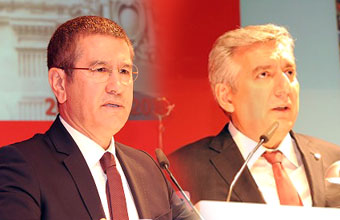
April ordinary Assembly meeting of the Istanbul Chamber of Industry convened at ICI Foundation Vocational Education Complex on April 26, 2017 under the main agenda of “The Importance of Türkiye's New Vision with regard to Our Economy and Industry after the Constitutional Change”. ICI Assembly meeting was moderated by Zeynep Bodur Okyay, ICI President of Assembly, and was attended by Nurettin Canikli, Deputy PM.
Erdal Bahçıvan, ICI Chairman, during his speech at the monthly ordinary meeting of ICI Assembly, said: "Stability and prediction are the pillars of economy and business. Having no elections until 2019 is an important opportunity to carry out the structural reforms. It is the time to enhance the image of Türkiye in global markets and to become an even more attractive country for investments.”
ICI Chairman Bahçıvan continued as such: “It is important for different groups to empathize about the Presidential Government System. Instead of conflict, social polarization and tension; democracy, peace, stability, and the belief in the country's integrity must determine our route. The key in achieving coordination during the reform period is synergy and cooperation among all stakeholders. There must be a closer cooperation and dialog within the real sector.
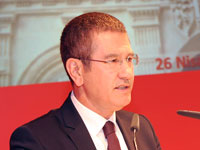
Nurettin Canikli, Deputy PM
Speaking at the ICI Assembly, Nurettin Canikli, Deputy PM, made important remarks about severance pay, one of burning issues for business world in recent years. Canikli noted that they are about to conclude the study on the Severance Pay Fund and they will soon put a practice reconciling both employers and workers into effect. Deputy PM Canikli continued his remarks:
“We will clear away the latent threat and fear within production and industry. If you were to realize accumulated compensations today, nobody would be able to overcome the resulting liability. Once the Severance Pay Fund is in force, value of our firms will increase in international markets. We will also seek labor representatives' consent on the issue. There will not be any compromise on workers’ rights.”
Zeynep Bodur Okyay, ICI President of Assembly, delivered the opening speech at the Istanbul Chamber of Industry’s ordinary assembly for April. Her remarks were briefly as follows:
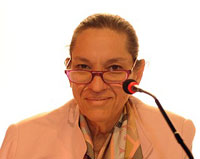
Zeynep Bodur Okyay,
ICI President of Assembly
“All prosperous countries throughout the world history acquired their wealth by means of industry. If we want to achieve rapid growth in Türkiye, industry must be the backbone of that growth. In an environment surrounded by global and regional uncertainties, we must continue to support industry. We see Asian countries like China, Vietnam, India, and Thailand that have outpaced global growth and export volumes in the last decade. These countries are among the ones increasing our foreign trade deficit. We have to find out how to compete with these countries. We may increase our share with a technology-oriented industry strategy instead of a sector-oriented one. It is a must to have mega projects as well as large projects in the field of industry. This country still has a story to tell. We are aware of that but should ensure world knows as well.
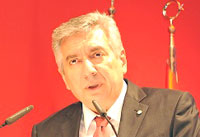
Erdal Bahçıvan, ICI Chairman
After concluding her speech, Zeynep Bodur Okyay, ICI President of Assembly, invited ICI Chairman Erdal Bahçıvan to take the stage. In his speech, Bahçıvan said: “The name of the new system accepted by our nation is the Presidential Government System. The vision of this system is effective management. As the Istanbul Chamber of Industry, we’re reviewing the effective management in terms of our economy and industry today.”
Noting that everyone is naturally curious as to how the new system and vision will affect economic life, Bahçıvan noted that this is now a transitional period and it is extremely important for different segments of society to empathize about the new system. Highlighting that the first regulations in the upcoming period will be on the new government system, Bahçıvan stated that it is a common desire of all for such steps to be taken in the most beneficial way for our economy in the long run.
Bahçıvan continued his remarks:
“We must act with haste to create a more stable and stronger economic environment. To be clear: For our economy, society and social prosperity, we have no time to waste. It is the time to enhance the image of Türkiye in global markets and to become an even more attractive country for investments. Let’s make use of this opportunity together. While talking about increasing the competitive power of our industry, I would like to draw attention to an increase in quality in particular. Looking at previous decades, we see that our economy achieved a remarkable improvement in every field in terms of quantity. In this period, however, we strive for a transformation in quality, which means that quality should be the primary focus in every field.”
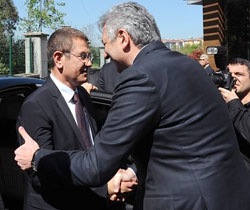
Stressing that all reforms must be carried out in harmony and coordination in order for structural reforms in different fields to be effective and productive, Bahçıvan pointed out that it is important to avoid multi-headedness in economy and to ensure coordination between ministries in the new period. Bahçıvan noted that the key in achieving this coordination is synergy and cooperation among all stakeholders as well as closer cooperation and dialogue with the real sector.
Emphasizing that ICI has a solution-oriented understanding attaching importance to the members’ problems, Bahçıvan continued as such: “We do not expect change to come from the state alone. We also have to drive the change ourselves. We argue for cooperation between the public and private sectors with a brand new notion. I would particularly like to express that we are open to all sorts of cooperation in this new period with such a notion. As ICI, we have the required expertise and confidence rooted in our 65-year legacy. In a nutshell, I have no doubt that we will create a more dynamic economy carrying us to a brilliant future.”
Bahçıvan pointed out the urgent need to improve the investment climate. Having stated that they have welcomed the measures recently taken by the government to improve the investment climate, Bahçıvan noted that not only domestic investments but also foreign direct investments, which are needed largely, should be revitalized.

Reminding that European Union is the biggest business partner in terms of both foreign direct investments and foreign trade, Bahçıvan said that there should be a sincere and sustainable relationship with the EU with a precise schedule and results removing uncertainties. Bahçıvan indicated that the demand voiced by ICI to revise Customs Union and expand its scope in order to accommodate changing commercial conditions continues to be relevant.
Bahçıvan emphasized that an environment where risks are reduced and the "safe country" perception is further strengthened will also revive the industrialists' and producers' desire to invest. Having noted that another core need of the industry is cheap, safe and sustainable energy, Bahçıvan stated that they expect the implementation of policies that will enhance the industry’s competitiveness in line with the national energy policy.
Pointing out that current VAT policy brought a burden on industry to transfer operating capital to the public using its already scarce resources, Bahçıvan said that they are excited about the developments regarding changes to the existing VAT system and eagerly await the outcome of this promising process.
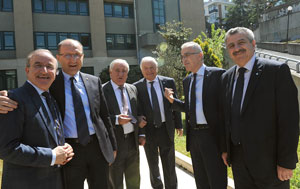
Bahçıvan concluded as such: “I believe that we have to acquire a new understanding that will add up depth and quality to change and transformation both in economic institutions and in economy. I particularly underline that we regard this meeting as an important step forward in adopting this understanding.”
Following Erdal Bahçıvan, Nurettin Canikli, Deputy PM took the stage and made important statements about several issues on the agenda of economy, industry and industrialists. Pointing out that export volume and global trade shrunk after the 2008 global crisis, Canikli argued that the protectionist trend is a rhetorical one. Canikli noted that protectionism is not possible in today’s well-advanced environment, and that no one can afford to slow down globalization. Indicating the risks in the region surrounding Türkiye have been declining in recent months, Canikli stated that they left the worst behind, due in no small part to the policies implemented in Türkiye.

Canikli declared that they are cooperating with all stakeholders when making decisions on economy. Citing the credit volume created by Credit Guarantee Fund in the last period as an example, Canikli reported that credit volume increased to TL 141 billion and the number of beneficiaries increased to 238,000. Denoting Türkiye should focus more intensively on its economic agenda following the referendum, Canikli noted that they are about to complete the work on production reform package. Emphasizing that traditional production forms cannot help Türkiye escape the middle-income trap, Canikli pointed out that they need to embrace a production system based on high technology and products with high added-value. Speaking of the “super” incentive model in order to realize this transformation, Canikli noted that they will adopt a special incentive system tailored for companies engaged in sectors that will drive this transformation, in line with their needs.
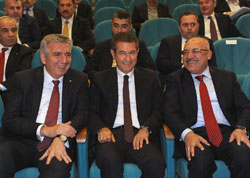
Noting they will take over the Turkish Sovereign Wealth Fund for development banking and long term financing Canikli said that " the development banking model was introduced successfully 80 to 100 years ago. We will implement it with the Turkish Sovereign Wealth Fund. The fund will also enable us to secure long-term, affordable and easily accessible financing from development banks. It will also help realize long-term and affordable investments, which would otherwise fail to secure financing under current market conditions. With current instruments, it is not feasible to finance investments that offer a return in 20 to 30 years, but we need these investments to take the leap. This is not a project of getting fund in exchange for public assets. It is not a privatization project either. We want to generate funds by the public and semi-public institutions which have a strong balance sheet, by providing that balance sheet as a guarantee.”
Pointing out to the finance market’s burden on banks, Canikli stated that they want to alleviate this burden with instruments such as zero-interest financial instruments, real estate certificates, and bank bonds. Canikli added that this burden is also a factor in driving interest rates up. Canikli added: “Voluntary PPS (Private Pension System) and automatic PPS are the tools for increasing and deepening savings. The voluntary PPS became extremely successful. The compulsory one will also be successful. We are also about to complete the Severance Pay Fund. We will clear away the latent threat and fear within production and industry. If you were to realize accumulated compensations today, nobody would be able to overcome the resulting liability. Once the Severance Pay Fund is in force, value of our firms will increase in international markets. We will also gain labor representatives' consent on the issue. There will not be any compromise on workers’ rights.”

Remarking on the high unemployment of 13% in January, Canikli stated that this increase was partly due to the growing shift from agricultural to non-agricultural employment in addition to the natural increase. Referring to need to create over one million jobs each year, Canikli emphasized that they created 850 thousand new jobs in a short period of 3 months, which he cited as a remarkable achievement.
Canikli also added that there will be no increase in public service prices this year, and that the two base point increase in inflation last year due to the public sector. Noting that they offer their support for those engaged in production and investment, Canikli pledged to continue their support in the future.
Deputy Prime Minister Nurettin Canikli later listened to the ICI Assembly members’ speeches on the agenda, and responded to questions.